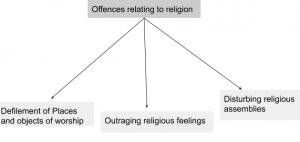This article is written by Gauraw Kumar, a 2nd-year student of BVP-New Law College, Pune. In this article, he covers “Offences Relating to Religion” and tries to discuss all the Sections of the Indian Penal Code surrounding it.
“If I were a dictator, religion and state would be separate. I swear by my religion. I will die for it. But it is my personal affair. The State has nothing to do it. The State would look after your secular welfare, health, communications, foreign relations, currency and so on, but not your and my religion. That is everybody’s personal concern.” -Mahatma Gandhi
Table of Contents
Introduction
India is a secular country and the principle of secularism falls in line with the Preamble of the Constitution along with Article 25, Article 26, Article 27, Article 28, Article 29 and Article 30 of the Indian Constitution. The Constitution of India grants freedom of religion. The Indian Penal Code discusses the provisions for offences relating to religion. In the case of Kutti Chanami Moothan v. Ranapattar (1978) 19 Cri LJ 960, it was held that ‘It is the main principle of good government that everyone should be offered to proclaim his own religion and that no man should be suffered to insult the religion of another.’
Chapter XV of the Indian Penal Code, 1860 discusses the offences relating to Religion.
Divisions of Offences Relating to Religion
Chapter XV (Of Offences Relating To Religion) of the Indian Penal Code contains five Sections- Section 295, Section 295A, Section 296, Section 297 and Section 298. The offences relating to religion can be broadly classified into three categories:
- Defilement of places of worship or objects of great respect (Section 295 and 297).
- Outraging or wounding the religious feelings of persons (Section 295A and 298).
- Disturbing religious assemblies (Section 296).
Defilement of Places of Worship or objects of Great Respect (veneration)
According to Section 295 of the IPC, “any person who destroys, damages or defiles any worship place, or any object declared as holy object by any class of persons with the intention of insulting the religious sentiments of any other class or with the knowledge that any of the class is likely to consider such destruction or defamation as an insult to their religion, shall be guilty and punishable with imprisonment of mentioned term which may extend to two years, or with fine, or with both.”
In simple words, if any act is done by a person which results in defamation and destruction of any worship place or object (which is declared as sacred by any religion) with a sole intention of insulting their religion, then that person shall be held liable under the Section 295 and shall be punishable with imprisonment, or with fine, or both.
Section 295 enforces people to respect the religious beliefs of persons of any religion. According to Section 297 of the IPC, “If a person (with an intention of destroying the religious feelings of any person, or hurt the religious feelings of any person, or with the knowledge that the feelings of any person are probably to be hurt or destroyed, or with the knowledge that the religion of any person is probably to be insulted) commits any trespass in any worship place or place of sculpture, or any place set aside from the performance of funeral rites or as a repository for the remains of the dead, or offers any shame to any human body, or causes disturbance to any persons assembled for the performance of funeral ceremonies, then that person shall be held liable under the IPC and he shall be punished with imprisonment of term, mentioned in description which may extend to one year, or with fine, or with both.”
In simple words, Section 297 deals with punishment to people (with the intention to hurt religious feelings of another) who commit a trespass in any worship place, or in sepulture, or burial, or place set apart for burial rites.
Ingredients of Section 295 and 297
In order to understand the concept of Section 295 and 297 more clearly, we have to know the essential ingredients of these Sections. The essential ingredients of Section 295 and 297 are:
- Intention or Knowledge.
- Destruction, damage or defilement of:
- A Worship place, or
- Veneration place.
- An object declared as a sacred object.
- Trespass into:
- Worship place, or
- Sepulture place, or
- A place of performing funeral rites or depository of remains of the dead.
Intention or Knowledge
It is an important ingredient to make anyone liable for the offence under Section 295 of IPC. It is very important that the person has the intention to destroy, damage or defile a place of worship or an object (declared as a holy object by any religion). Without any malafide intention to hurt religious feelings, a person cannot be held liable under Section 295. Mere defilement of a place of worship is not offensive under these Sections. The intention to insult is assessed by the facts and circumstances of the case.
If ‘A’ belongs to Hindu religion and he removed some old building materials of a mosque that were in rotten condition and in disuse; ‘A’ would be held not liable under Section 295 and 297 of IPC because he had no intention to insult any religion. He had no knowledge that his actions will cause hurt to any religion.
‘A’ belongs to Mohammedan religion and he throws a lit cigarette on the Viman (a holy object of Hindu religion), it cannot be claimed to be an unintentional act. Such action will be offensive under IPC. Sexual intercourse inside a mosque or a temple is an offence under Section 297 of the IPC.
Destruction, Damage or Defilement
These words should be understood in the sense of making property dirty, unclean or foul. It does not mean only physically or materially damaging the property but it is also something, that would affect the pure state of the place. The word ‘defilement’ does not mean only physical destruction but also situations where a place of worship or holy object of worship coated ritually or in an impure manner.
Place or Object to be Sacred
It is an essential ingredient of this Section that the destruction caused must be of a place of worship or holy place. As a general rule, temples, churches, mosques, synagogues, kyaungs are considered holy places by virtue of them being places of worship. In the case of Joseph v. State of Kerala, a hut was used as a worship place by people of a specific religion. ‘A’ took possession by court order and took down the images of the Hindu Gods and was charged under Section 295. The High Court held that ‘A’ has the right to do whatever he has done and he had not intended to hurt the religious beliefs and holy object and hence, he was held not guilty. Religious books like the Bible, the Koran, the Granth, the Gita etc. are held to be sacred even though they are not worshipped per se.
Trespass into a place of worship or place of sepulture
According to Section 297, a person is liable when he trespasses (not need to criminal trespass) into a place of worship or of sepulture. The word ‘trespass’ in this Section means an unjustifiable intrusion upon a property that is in the control of another. Sexual intercourse within a place of worship would make liable under this Section.
Indignity to Human corpse (body) and Disturbing and defaming Funeral Rites
Any type of contempt to a human corpse disturbing the performance of funeral rites is a criminal offence under Section 297. ‘Disturbance’ means any type of active intrusion to the funeral ceremonies. In the case of Basir-ul-Huq v. State of West Bengal, the mother of ‘A’ died. He, along with others, took the body to the cremation grounds. In the meantime, the accused filed a complaint to the police stating that ‘A’ had throttled his mother to death. After that, he came with police on cremation grounds and disturbed the ceremonies. But, it was found that the death of A’s mother had occurred naturally. ‘A’ filed a complaint against accused under Section 297. The accused was held guilty and was sentenced to three months of rigorous imprisonment.

Outraging religious feelings
Section 295A deals with ‘Intentional and spiteful activities, intended to outrage religious beliefs of any class by insulting its religion or religious beliefs’. According to this Section, any person, with the spiteful intention of insulting the religious feelings of any class of citizens of India with words (spoken, written or by visible presentation or by other methods) insults or attempts to insult the religion or the religious feelings of any class, shall be held liable and punished with imprisonment of either mentioned term which may extend to three years, or with fine, or with both.
Section 298 deals with ‘Uttering, words, etc with deliberate intent to injure the religious beliefs of any person.’ According to this Section, any person (with the deliberate intention of insulting the religious feelings of any other person) who does the following activities shall be punished with imprisonment for a mentioned term in the description which may extend to one year, or with fine, or with both:
- Utters any word or makes any sound which is in hearing of that person.
- Makes any gesture which is in the sight of that person.
Ingredients of Section 295A and 298
These sections of the Indian Penal Code deals with the act done deliberately with an intent to insult any religious feelings or sentiments.
Section 295A deals with actions intended to insult religious feelings or sentiments of a particular class, whereas Section 298 deals with punishment of those actions (verbal or visible) that intend to insult religious feelings of another.
Disturbing Religious Assemblies
Section 296 deals with ‘Disturbing religious assembly.’ Any person who voluntarily causes disturbance to any assembly (which is lawfully engaged in the performance of worship), or religious ceremonies shall be liable in this Section and punished with imprisonment of either mentioned term which may extend to one year, or with fine, or with both.
Ingredients of Section 296
Essential ingredients of this Section are:
- A lawful assembly which is engaged in the performance of religious worship or ceremony.
- Such assembly and ceremony should be lawful.
- Any types of disturbance are caused by an accused.
- Activities of accused must be voluntary.
This Section gives special protection to assembly worship. It does not extend over individual worship. An assembly of religion is regarded as lawful unless it interferes with the ordinary use of the streets by the public.
Conclusion
India is a secular country and every Indian has a ‘right to religion’ given in our Indian Constitution. Chapter XV (Section 295 to 298) of the Indian Penal Code deals with offences and punishment of offences relating to religion. No one can insult anyone’s religious beliefs and any holy object of any religion. If anyone does so, punishment is mentioned in the Indian Penal Code. Offences relating to religion are broadly classified into three main categories: Defilement of places and holy objects of any religion, insulting any religious feelings and disturbing religious assemblies and religious ceremonies. In this way, the protection of religious rights is arranged in Indian laws.
References
Students of Lawsikho courses regularly produce writing assignments and work on practical exercises as a part of their coursework and develop themselves in real-life practical skill.
https://t.me/joinchat/J_0YrBa4IBSHdpuTfQO_sA
Follow us on Instagram and subscribe to our YouTube channel for more amazing legal content.
 Serato DJ Crack 2025Serato DJ PRO Crack
Serato DJ Crack 2025Serato DJ PRO Crack











 Allow notifications
Allow notifications


